
IBS Centers are research centers operated by the Institute for Basic Science. There are 31 institutes as of August 2020. [1] Centers are organized into six disciplines according to their research area: [2]

IBS Centers are research centers operated by the Institute for Basic Science. There are 31 institutes as of August 2020. [1] Centers are organized into six disciplines according to their research area: [2]

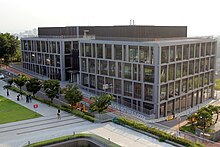
As of August 2022, the following HQ, campus, and extramural IBS Centers exist (in alphabetical order): [1]
| Name | Director | City, university | Research area |
|---|---|---|---|
| Center for Advanced Reaction Dynamics | Ihee Hyotcherl | Daejeon, KAIST | Chemistry |
| Center for Algorithmic and Robotized Synthesis (Formerly Center for Soft and Living Matter) | Bartosz Grzybowski | Ulsan, UNIST | Interdisciplinary |
| Center for Artificial Low Dimensional Electronic Systems | Yeom Han-woong | Pohang, POSTECH | Physics |
| Center for Axion and Precision Physics Research | Yannis K. Semertzidis | Daejeon, HQ | Physics |
| Center for Catalytic Hydrocarbon Functionalizations | Chang Sukbok | Daejeon, KAIST | Chemistry |
| Center for Climate Physics | Axel Timmermann | Busan, Pusan National University | Earth science |
| Center for Cognition and Sociality | Changjoon Justin Lee | Daejeon, HQ | Life sciences |
| Center for Cognition and Sociality | Kaang Bong-kiun | Daejeon, HQ | Life sciences |
| Center for Complex Geometry | Hwang Jun-Muk | Daejeon, HQ | Mathematics |
| Center for Correlated Electron Systems | Noh Tae-won | Seoul, Seoul National University | Physics |
| Center for Van der Waals Quantum Solids | Jo Moon-Ho | Pohang, POSTECH | Physics |
| Center for Exotic Nuclear Studies | Kevin Insik Hahn | Daejeon, HQ | Physics |
| Center for Genome Engineering | Koo Bon-Kyoung | Seoul, Seoul National University | Interdisciplinary |
| Center for Genomic Integrity | Myung Kyungjae | Ulsan, UNIST | Life sciences |
| Center for Geometry and Physics | Yong-Geun Oh | Pohang, POSTECH | Mathematics |
| Center for Integrated Nanostructure Physics | Lee Young Hee | Suwon, Sungkyunkwan University | Physics |
| Center for Molecular Spectroscopy and Dynamics | Cho Minhaeng | Seoul, Korea University | Chemistry |
| Center for Multidimensional Carbon Materials | Rodney S. Ruoff | Ulsan, UNIST | Chemistry |
| Center for Nanomaterials and Chemical Reactions | Ryoo Ryong | Daejeon, KAIST | Chemistry |
| Center for Nanomedicine | Cheon Jinwoo | Seoul, Yonsei University | Interdisciplinary |
| Center for Nanoparticle Research | Hyeon Taeghwan | Seoul, Seoul National University | Chemistry |
| Center for Neuroscience Imaging Research | Kim Seong-gi | Suwon, Sungkyunkwan University | Interdisciplinary |
| Center for Quantum Nanoscience | Andreas J. Heinrich | Seoul, Ewha Womans University | Physics |
| Center for Relativistic Laser Science | Nam Chang-hee | Gwangju, GIST | Physics |
| Center for RNA Research | Kim V. Narry | Seoul, Seoul National University | Life sciences |
| Center for Self-assembly and Complexity | Kim Kimoon | Pohang, POSTECH | Chemistry |
| Center for Study of Emerging and Re-emerging Viruses | Choi Young Ki | Daejeon, KAIST | Life sciences |
| Center for Synaptic Brain Dysfunctions | Kim EunJoon | Daejeon, KAIST | Life sciences |
| Center for Theoretical Physics of Complex Systems | Sergej Flach | Daejeon, HQ | Physics |
| Center for Theoretical Physics of the Universe | Choi Kiwoon | Daejeon, HQ | Physics |
| Center for Underground Physics | Kim Yeongduk ( ko ) | Daejeon, HQ | Physics |
| Center for Vascular Research | Koh Gou Young | Daejeon, KAIST | Life sciences |
| Center for Viral Immunology | Shin Eui-Cheol | Daejeon, KAIST | Life sciences |
Pioneer Research Centers (PRC) are headquarters-based centers headed not by a director, but by a group of up to five chief investigators. As of August 2022, the following IBS pioneer research centers exist (in alphabetical order): [3]
| Name | Group | Chief investigator | Research area |
|---|---|---|---|
| PRC for Biomolecular and Cellular Structure | Protein Communication Group | Kim Ho Min | Interdisciplinary |
| PRC for Climate and Earth Science | Planetary Atmospheres Group | Lee Yeon Joo | Earth science |
| PRC for Mathematical and Computational Sciences | Biomedical Mathematics Group | Kim Jae Kyoung | Mathematics |
| Data Science Group | Cha Meeyoung | Mathematics | |
| Discrete Mathematics Group | Oum Sang-il | Mathematics | |
| Extremal Combinatorics and Probability Group | Liu Hong | Mathematics | |
| Name | Director | City, University | Research area | Closure date |
|---|---|---|---|---|
| Academy of Immunology and Microbiology | Charles Surh | Pohang, POSTECH | Life sciences | October 2019 |
| Center for Plant Aging Research | Nam Hong Gil | Daegu, DGIST | Life sciences | August 2021 |

Technische Universität Berlin is a public research university located in Berlin, Germany. It was the first German university to adopt the name "Technische Universität".

Daejeon is South Korea's fifth-largest metropolis, with a population of 1.5 million as of 2019. Located in a central lowland valley between the Sobaek Mountains and the Geum River, the city is known both as a technology and research center, and for its close relationship with the natural environment. Daejeon serves as a hub of transportation for major rail and road routes, and is approximately 50 minutes from the capital, Seoul, by KTX or SRT high speed rail.
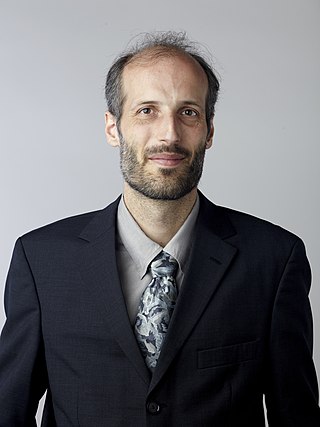
Sir Martin Hairer is an Austrian-British mathematician working in the field of stochastic analysis, in particular stochastic partial differential equations. He is Professor of Mathematics at EPFL and at Imperial College London. He previously held appointments at the University of Warwick and the Courant Institute of New York University. In 2014 he was awarded the Fields Medal, one of the highest honours a mathematician can achieve. In 2020 he won the 2021 Breakthrough Prize in Mathematics.
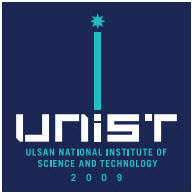
Ulsan National Institute of Science and Technology, is one of the four public universities in South Korea which are dedicated to research in science and technology, along with KAIST, GIST, and DGIST. UNIST was founded in 2007 in response to growing demand for higher education in the Korean industrial capital of Ulsan, where world-renowned automotive, shipbuilding, petrochemical, and secondary cells industries are clustered. At the time of its foundation, UNIST was known for being the first national university in South Korea to be incorporated and thus administered by an independent board of trustees despite being funded by the central government.
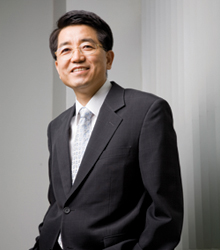
Taeghwan Hyeon is a South Korean chemist. He is SNU distinguished professor in the School of Chemical and Biological Engineering at Seoul National University, director of Center for Nanoparticle Research of Institute for Basic Science (IBS), and an associate editor of the Journal of the American Chemical Society.

Hee-sup Shin is a South Korean neuroscientist whose work focuses on brain research of genetically engineered mice via gene knockout in order to better understand the human brain. His research resulted in him being named a National Scientist by the Korean Ministry of Science and Technology. He is a former co-director of the Center for Cognition and Sociality leading the Social Neuroscience Group in the Institute for Basic Science (IBS) located at Korea Advanced Institute of Science and Technology (KAIST).
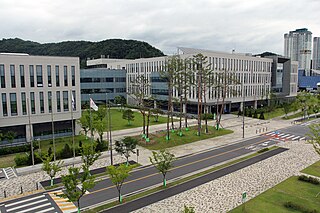
The Institute for Basic Science is a Korean government-funded research institute that conducts basic science research and relevant pure basic research. Comprising approximately 30 research centers with more than 60 research groups across the nation and a headquarters in Daejeon, IBS has approximately 1,800 researchers and doctoral course students. Around 30% of the researchers are from countries other than South Korea. The organization is under the Ministry of Science and ICT.

Koh Gou Young is a researcher from South Korea studying organ vasculature and lymphatic vessels with an interest in angiogenesis, lymphangiogenesis, adipogenesis, and cardiogenesis. His research has contributed to the publication of more than 200 journal articles, including multiple publications on how Tie2 deficits are related to sepsis, blood-retinal barrier damage, and an imbalance of intraocular pressure in Schlemm's canal which induces glaucoma.

Andreas J. Heinrich is a physicist working with scanning tunneling microscopy, quantum technology, nanoscience, spin excitation spectroscopy, and precise atom manipulation. He worked for IBM Research in Almaden for 18 years, during which time he developed nanosecond scanning tunneling microscopy which provided an improvement in time resolution of 100,000 times, and combined x-ray absorption spectroscopy with spin excitation spectroscopy. In 2015 his team combined STM with electron spin resonance, which enables single-atom measurements on spins with nano-electronvolt precision REF1, REF2. In 2022 his team demonstrated the extension of ESR-STM to individual molecules REF3. Heinrich was also principal investigator of the stop-motion animated short film A Boy and His Atom filmed by moving thousands of individual atoms. He is a fellow of the American Physical Society and the American Association for the Advancement of Science and the recipient of the Heinrich Rohrer Medal of the Japan Society of Vacuum and Surface Science.

The Center for Quantum Nanoscience was founded in 2017 as part of efforts for South Korea to expand basic science research. Classified as an Extramural Center of the Institute for Basic Science, it is hosted by Ewha Womans University in Seoul, South Korea. Their research focuses on exploring quantum properties of atoms and molecules on surfaces and interfaces and long-term goals of quantum sensing and quantum computation in those areas.

Noh Do Young is a South Korean physicist specializing in condensed matter physics and materials science using synchrotrons and XFELs. He has developed and applied various frontier X-ray diffraction methods to study condensed matter systems, including recent coherent X-ray diffraction imaging technique. His research has utilized a number of synchrotron radiation facilities, such as Advanced Photon Source, SPring-8, National Synchrotron Light Source, PLS, and X-ray free electron lasers, including SCALA and PAL-XFEL.
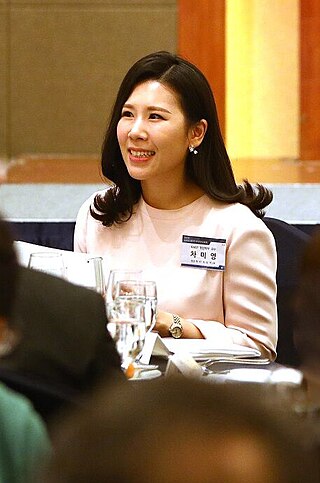
Cha Meeyoung, sometimes known as Mia, is an associate professor at KAIST in the School of Computing and a chief investigator in the Pioneer Research Center for Mathematical and Computational Sciences at the Institute for Basic Science. Her research focuses on network and data science with an emphasis on modeling, analyzing complex information propagation processes, machine learning-based computational social science, and deep learning. In June 2024, she will become the scientific director of the Max Planck Institute for Security and Privacy. She has served on the editorial boards of the journals PeerJ and ACM Transactions on Social Computing.

Kim Doochul is a South Korean theoretical physicist. He was head of the Department of Physics, director of the BK21 Physics Research Division, and professor emeritus at Seoul National University. He was also a fellow and chairperson in the Korean Academy of Science and Technology before becoming the fifth president of Korea Institute for Advanced Study and the second president of Institute for Basic Science. He was a standing trustee with the Asia Pacific Center for Theoretical Physics and a board of Trustee member of the Korean Physical Society.
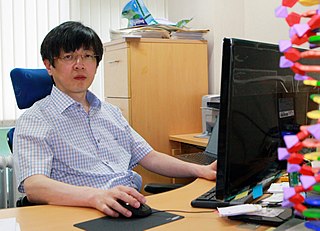
Kim Jin-Soo is a chemist, biologist, and entrepreneur. He was CEO and CSO, ToolGen, Inc., is a professor in the Department of Chemistry of Seoul National University and director of the Center for Genome Engineering. His research team has developed and improved several types of programmable nucleases, specifically zinc finger nucleases (ZFNs), TAL effector nucleases (TALENs), and RNA-guided engineered nucleases (RGENs). In 2018, he was a Clarivate Analytics Highly Cited Researcher in the cross-field category and in the biology and biochemistry category in 2019.

Charles D. Surh was a leading scientist in the field of immunology. He was a professor at both The Scripps Research Institute and Pohang University of Science and Technology (POSTECH), director of the Academy of Immunology and Microbiology in Pohang, and associate editor of the journal Pleura and Peritoneum. He died from cancer in 2017.

Oum Sang-il is a Korean mathematician working in graph theory and discrete mathematics. He is a tenured professor in the Department of Mathematical Sciences at KAIST and the chief investigator of the Discrete Mathematics Group in the Pioneer Research Center for Mathematical and Computational Sciences at the Institute for Basic Science. He is known for his work on structural graph theory and in particular for structures and algorithms relating to rank-width, clique-width, and branch-width. He published more than 45 journal papers.
Christopher William Bielawski is a distinguished professor at Ulsan National Institute of Science and Technology and group leader of the Synthesis Group in the Center for Multidimensional Carbon Materials. His research in synthesis and polymer chemistry has resulted in more than 290 publications and multiple patents.
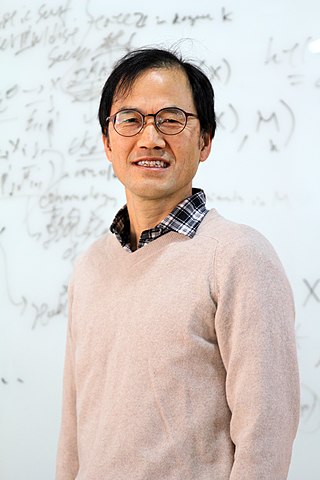
Yong-Geun Oh is a mathematician and distinguished professor at the Pohang University of Science and Technology and founding director of the IBS Center for Geometry and Physics located on that campus. His fields of study have been on symplectic topology, Floer homology, Hamiltonian mechanics, and mirror symmetry He was in the inaugural class of fellows of the American Mathematical Society and has been a member of Institute for Advanced Study, Korean Mathematical Society, and National Academy of Sciences of the Republic of Korea and is on the editorial boards of Journal of Gokova Geometry and Topology and Journal of Mathematics of Kyoto University.

Kim Jae Kyoung is a biomedical mathematician and associate professor at KAIST in the Department of Mathematical Sciences and a chief investigator in the Pioneer Research Center for Mathematical and Computational Sciences at the Institute for Basic Science. His research focuses on mathematical biology and medicine, specifically the combination of nonlinear dynamics, the theory of stochastic processes, and computational science, to better understand disease mechanisms and develop relevant treatment strategies, including drug and digital medicine for sleep disorders.
...29 research centers as of October 2019.